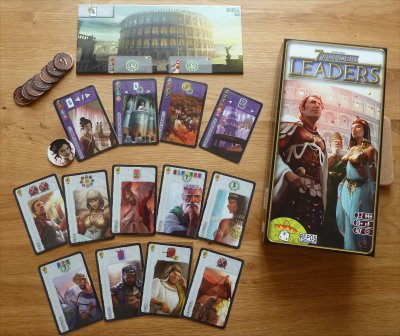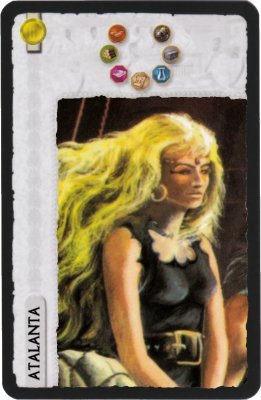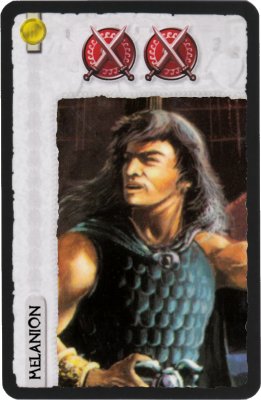|
With 7 Wonders receiving many-voiced praise for its innovative approach which unites comparatively easy cardgames rules with a full-sized civilization development theme, the question might be asked whether such a game really needs an expansion. As a matter of fact, Cedrick Caumont from REPOS PRODUCTION hinted at one or two upcoming expansions already at the SPIEL '10 convention, and now (barely 8 months after the initial release of 7 Wonders), we have got the new Leaders-Expansion at hand. So, let's have a look how the initial question for the necessity of an expansion can be answered.
As the title suggests, 7 Wonders - Leaders introduces historical personalities as a new type of cards and thus as a new concept into the game. When the idea came up, author Antoine Bauza was faced with the question whether the new Leader-cards should become available through the same mechanism of card distribution as the building cards of the different ages, but for a number of reasons this mechanism does not seem fitting to include the new Leaders. Most prominent here is the fact that each of the 36 Leaders offers an individual ability which comes to bear either during the course of the game or at the end (then providing additional victory points), and if the Leaders would have been included with the other cards of an age the factor of luck to receive a Leader which fits well into a player's strategy simply would have been too high. Instead, the Leader cards follow their own mechanism which is supplementing the course of an age which we know from the basic game.

So, before the game starts with the first age, the players first get to play a special Leaders-phase in which each player is dealt a random hand of four Leaders. One of these Leaders may be kept by the player, whereas the remaining three cards must be handed over to the player's right neighbour. Now, once again each player chooses a character and hands the remaining cards to the next player, and this procedure continues until each player has received a hand of four leaders following this semi-deterministic method.
At the beginning of each age, before the players build their first building, a special Leader-phase is added to the turn sequence. In this phase, the players simultaneously chose one of their remaining Leader-cards which they may either hire, sell or use for completing a stage of their wonder. Hiring is done by placing the card openly on the table and paying the required amount of coins to the bank, whereas selling means that the Leader card is returned to the box in return for an income of three coins coming from the bank. As indicated, the third alternative is to use the Leader-card to build a stage of the player's wonder, and if this option is used the stage is built in exactly the same way as during an age, which means that the costs for the wonder stage must be paid and the Leader is placed face-down under the wonder-board in order to indicate which stage had been built.
To my mind, this simple but elegant mechanism has allowed a very smooth inclusion of the new Leaders, and their threefold usability which follows the uses of standard building cards guarantees a maximum usefulness even for players who might not have received Leaders with fitting special abilities. Talking about special abilities, the time also has come to examine these abilities a bit closer, since the variety of effects caused by the Leaders is quite considerable.
So, great military strategists like Caesar or Hannibal will provide additional military strength, whereas scientists like Pythagoras, Euklid or Ptolemaeus give additional research symbols. Personalities like Archimedes, Leonidas, Hammurabi or Imhotep reduce the costs for certain types of building cards or for the stages of a wonder by one resource, in contrast to Nero or Xenophon which bring some additional income when a specific kind of building cards is built. Certain leaders have one-time effects, and so Croesus brings a treasure of six coins whereas Salomon allows its player to build one free building card from the stack of discarded cards. A broad choice of characters brings additional victory points for specific cards or situations at the game's end, and so characters like Varro or Pericles grant victory points for specific building cards, Amyitis brings victory points for each complete stage of a wonder, Alexander increases the point value of military victories etc.. As indicated, the choice of Leaders generating victory points covers many aspects of the game, culminating in the inclusion of four beautiful queens like Cleopatra which may generate up to 5 additional victory points by their simple presence.
All in all, the different abilities of the Leaders open up a whole range of new strategic approaches, and the fact that the initial choice of Leaders is handled secretly means that each player now will have his own hidden agenda to maximize the usefulness of his chosen Leaders. At the same time, the Leaders also might open up even stronger competition because some players might desire the same kinds of cards, and so the strategic approach felt in the basic game becomes even more palpable.
The expansion even includes a new wonder (Rome) and four new guild cards, and all of these are fine-tuned to supplement the new strategic approaches which are opened up by the Leaders. Because of the monetary costs for each Leader money becomes even more important than in the basic game, and this value is reflected by the Guild of Players which gives a player one additional victory point for each three coins possessed at the game's end (how convenient if you possess Midas at the same time, because he generates another victory point for each three coins!). A more direct effect considering Leaders has the Guild of Diplomats which generates a victory point for each Leader in the two neighbouring cities, and especially tricky is the Guild of Courtesans which allows its owner to duplicate the special ability of a Leader from one of the neighbouring cities. Finally, the eternal city of Rome generates a special attraction for Leaders, and so the player who possesses this wonder will be allowed to purchase Leaders at a cheaper price and possibly even be able to bring one or two additional leaders into play.
To answer the initial question: YES, the Leaders are a wonderful and absolutely fitting expansion for 7 Wonders. While newcomers to the game should avoid the Leaders for the first two or three rounds in order to get a feeling for the flavour of the basic game, seasoned 7 Wonders veterans will love the expansion for the additional playing depth and strategy created by the new elements. The expansion is perfected by the stunning artwork of each of the 36 Leaders, and so 7 Wonders - Leaders can be given a full, unrestricted recommendation!!!
G@mebox SpecialATLANTIS - THE SUNKEN KINGDOM

 
Click on images to enlarge and download!
While the existence of the seven Wonders of the ancient world has been scientifically proved, a great myth which can be found in ancient writings by Platon still is a riddle for archaeology. I am talking about the story of Atlantis, and what would be more fitting than introducing the fabled continent of Atlantis to the game? Thus, I would like to introduce the wonderful city of Atlantis and its two rulers - Queen Atalanta and King Melanion.
This expansion must be played together with the official 7 Wonders - Leaders expansion. The player who plays Atlantis gets both Atlantis character cards (Queen Atalanta and King Melanion) together with the Wonder-card. Both characters are placed partly under the wonder, so that only the portraits but not the character's abilities are visible at the beginning of the game.
Atlantis functions somewhat differently than the other wonders. As you can see, each of the character slots shows three times one victory point, and instead of slowly building a wonder to generate victory points, these points will be scored at the game's end if the points are still visible. However, if a player wants to activate a character for ONE AGE, he must cover one of the victory points with three coins. The coins and the victory point will be LOST, but the player may use the character for the rest of this AGE. This is symbolized by pulling the character out from under the wonder sheet, so that her/his abilities are visible.
Both characters can be activated this way during the same age, but they must be activated FOR EACH AGE SEPARATELY. So, if the player wants to use both characters in all three ages, he has to spend 18 coins (6 times 3), and he will loose all six victory points because all points on the wonder sheet have been covered.
At the end of an age, after the solving of the military conflicts, all activated characters are returned to their initial positions halfway under the wonder so that their special abilities once again are hidden.
Activation of a character does not take up a player's action, but instead it can be done in addition to the player's normal turn. The special abilities of both characters are as follows:
- King Melanion grants two shields for the the rest of the age.
- Queen Atalanta grants a free resource of the player`s choice EVERY TURN for the rest of the age.
Finally, Atlantis does not produce any kind of resources, but due to its vast riches his owner will get one coin during every turn of the game.
As you can see, these rules try to emulate the observation that the initial richness of Atlantis is slowly depleted ("The Downfall of Atlantis"). Atlantis starts with a lot of victory points and has a good monetary income, but some of this initial fortune must be used if the Atlantis-player wants to use the powers of the royal couple. So, the player has to decide carefully whether the activation of a character is worth the loss of the money and the victory point.
Playtesting has revealed that these rules are fairly well balanced, but if you feel that Atlantis is too strong in comparison to the other wonders you might simply increase the activation costs for a character to four coins. This small rise actually results in the fact that the initial income generated by Atlantis is not sufficient for activating both characters in the same age.
At this point I would also like to thank Cedrick from REPOS PRODUCTIONS for his permission to publish this mini-expansion as a G@mebox Convention Special, and I would love to hear your feedback on the playability of Atlantis!
| 


